Appearance
Skip to content This article provides an overview of the pre-configured infrastructure stack that ships with the Metaplay SDK.
Target Audience
This page is primarily intended for users of the Self Hosting (Private Cloud) tier package. If you are using any of the Metaplay SaaS plans, information from this page may not be directly relevant to your needs.
Dependencies
- Public cloud providers - Metaplay’s infrastructure stack is designed on top of AWS cloud services. Prior experience with operating public cloud resources will greatly help with getting up-to-speed with our stack.
- Docker and Kubernetes - While not strictly necessary, we assume you are familiar with Docker containers and Kubernetes clusters to get the most out of this article.
Overview
The Metaplay SDK includes a pre-configured cloud infrastructure stack. This stack is the same one we use internally to host and manage your development environments, allowing customization and deployment of multiple environments as needed for your game team. Leveraging our infrastructure stack allows you to benefit from our hand-tuning and best practices, making future SDK updates straightforward.
Metaplay SDK’s cloud infrastructure operates in the AWS cloud. We utilize many of their managed services to keep operational complexity low. For example, game servers and associated services are deployed as containers on AWS’ managed Kubernetes platform, EKS.
Infrastructure as Code
Metaplay SDK’s cloud infrastructure is provided as scripts to ensure high portability and ease of management:
- Terraform scripts - For provisioning the full infrastructure stack.
- Helm charts - For managing the Kubernetes applications after the infrastructure has been provisioned.
The infrastructure components and dependencies are regularly updated in Metaplay SDK releases to maintain security and compatibility with the broader infrastructure ecosystem!
💡 Pro Tip
The infrastructure provisioning scripts are modular and extensible, allowing easy customization for your game’s or studio’s specific needs.
AWS Architecture
Metaplay SDK’s cloud infrastructure follows a two-tier architecture designed for high availability, self-healing, and security. Core game services are complemented by specialized services such as file storage, load balancers, content delivery, authentication, observability, backups, and more.
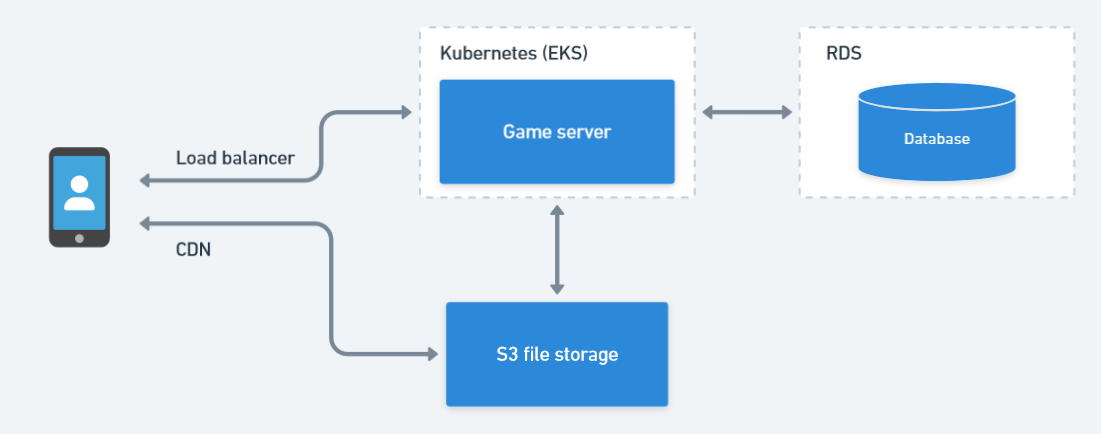
- Application servers - Running in Amazon Elastic Kubernetes Service.
- Data persistence - In Amazon Relational Database Service.
Scaling
Each part of the service stack is designed for high efficiency and scalability. Load balancers, CDN, and file storage are inherently scalable, managed AWS services. Kubernetes and RDS clusters can be scaled both vertically (more powerful VMs) and horizontally (more VMs).
The Metaplay game server’s software architecture is distributed and scales well with more and faster cores, providing flexibility in choosing the best-suited (and cost-optimized) instance types for your deployments!
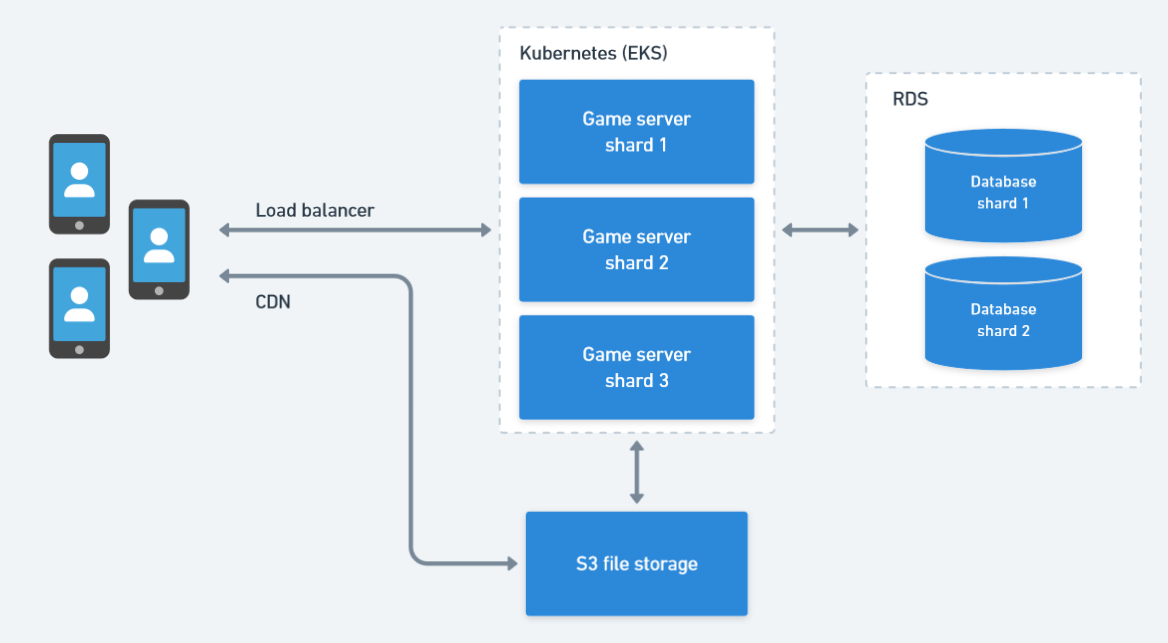
- Load balancing - Using Amazon NLB
- Content delivery - Through Amazon CloudFront
- File storage - Provided by Amazon S3
DevOps Tooling
Effective daily operations require the right tools. We’ve built and tuned the full stack of industry-standard DevOps tools covering initial provisioning, configuration, deployments, and daily monitoring of high DAU games.
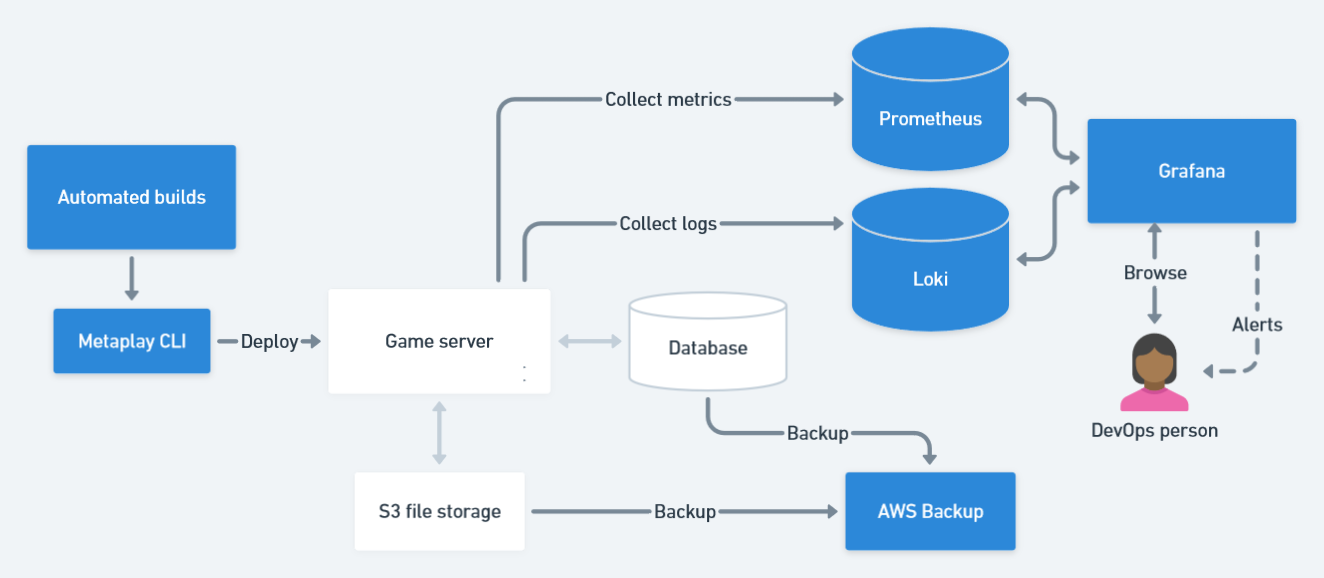
- Automated builds - Bring your own! We recommend (and have pre-configured scripts for) GitHub Actions and TeamCity.
- Metaplay CLI - A utility for easily executing common manual commands needed to interact with your live deployments, such as uploading a new game server build.
- Backups - We support AWS Backup for backing up and persisting game databases and file storage buckets through snapshots, allowing you to revert if errors occur or rebuild your entire stack if needed.
- Metrics - We facilitate automatic collection of a wide array of game server metrics, as well as metrics of other supporting systems such as the underlying infrastructure.
- Logs - We collect and persist logs of game servers and other systems to allow efficient debugging and tracing of issues across distributed systems.
- Monitoring dashboard - We’ve created a curated set of monitoring dashboards, providing an at-a-glance view of how your game servers and infrastructure are operating.
- Alerts - We provide an extendable set of alerting rules that allow you to be alerted if the health of game servers or underlying infrastructure is reduced. You can be alerted on the most common IM and paging platforms, giving you flexibility in who, when, and how should be contacted.
Kubernetes Architecture
The Metaplay SDK’s application layer runs as containers within Kubernetes. All application data is transient and persisted outside of Kubernetes, allowing application containers (or even the whole cluster) to be destroyed without data loss.
- Game server resources - Services directly related to the game server application.
- Supporting services resources - Services that help observe and manage the game server.
- Cluster tooling - Contains the “necessary evil” services of running a Kubernetes cluster securely and efficiently.
We’ve extended the base Kubernetes resource types with Metaplay resource types and an operator, allowing for easier control of the lifecycle of game payloads. All Kubernetes payloads can be split into three main categories: game server resources, supporting service resources, and cluster tooling. The applications between these categories are segregated and can be managed in separate lifecycles and cadences.
Our provisioning scripts also handle the provisioning of tightly controlled service accounts, secrets management, and environment-specific runtime configuration of the clusters’ services.
Game Server Resources
Game server resources are services directly related to the game server application.
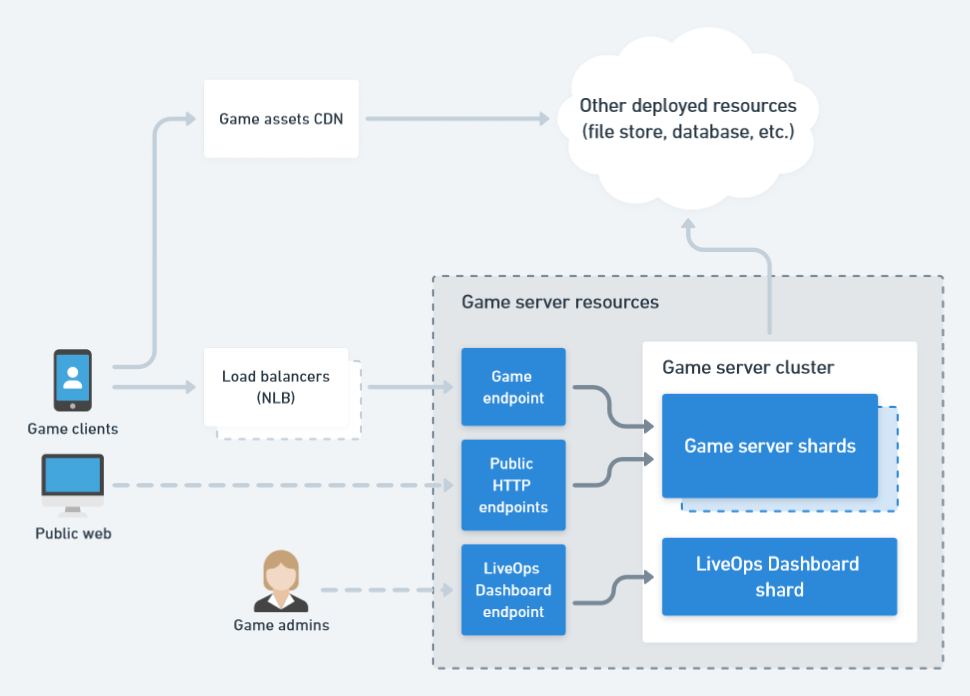
The game server cluster has dedicated endpoints for the various sub-services.
- Game server - Docker containerized game server builds running in Kubernetes pods. The specific configuration of different types of shards and their workloads can be fine-tuned for your game’s specific needs.
- LiveOps Dashboard - Web-based tools for the game development, support, and operations teams to manage the game. Hosted by ASP.NET running on the game server cluster.
- Ingress & endpoints
- Game endpoint - Kubernetes load balancer service that provides an endpoint for game client communication.
- Public HTTP endpoint - Support for setting up public HTTP endpoints as needed. A typical use-case is for webhook endpoints where other services can send calls to.
- LiveOps Dashboard and the game server API - Protected private HTTP endpoint for providing administrators access to the LiveOps Dashboard, observability tools and for making calls to the game server APIs.
Supporting Service Resources
Supporting services resources are services that help observe and manage the game server.
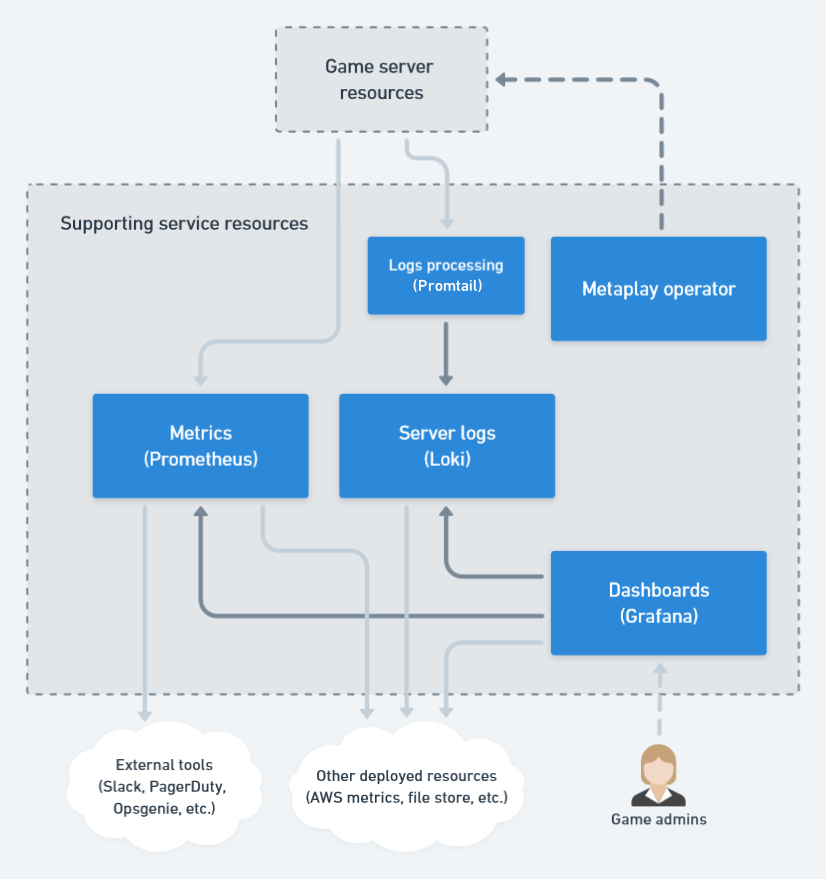
- Metaplay operator - Operates the life-cycle of game servers.
- Observability stack
- Metrics - Metrics are collected and stored in Prometheus.
- Logs - Server logs are collected and stored in Loki.
- Log collection - Logs of all pods running on Kubernetes are collected by per-node Promtail instances and sent to Loki.
- Dashboards - The collected metrics and logs are visualized in pre-configured Grafana dashboards.
Cluster Tooling
Cluster tooling contains the “necessary evil” services of running a Kubernetes cluster securely and efficiently. The services in this category generally require the least customization for Metaplay’s needs.
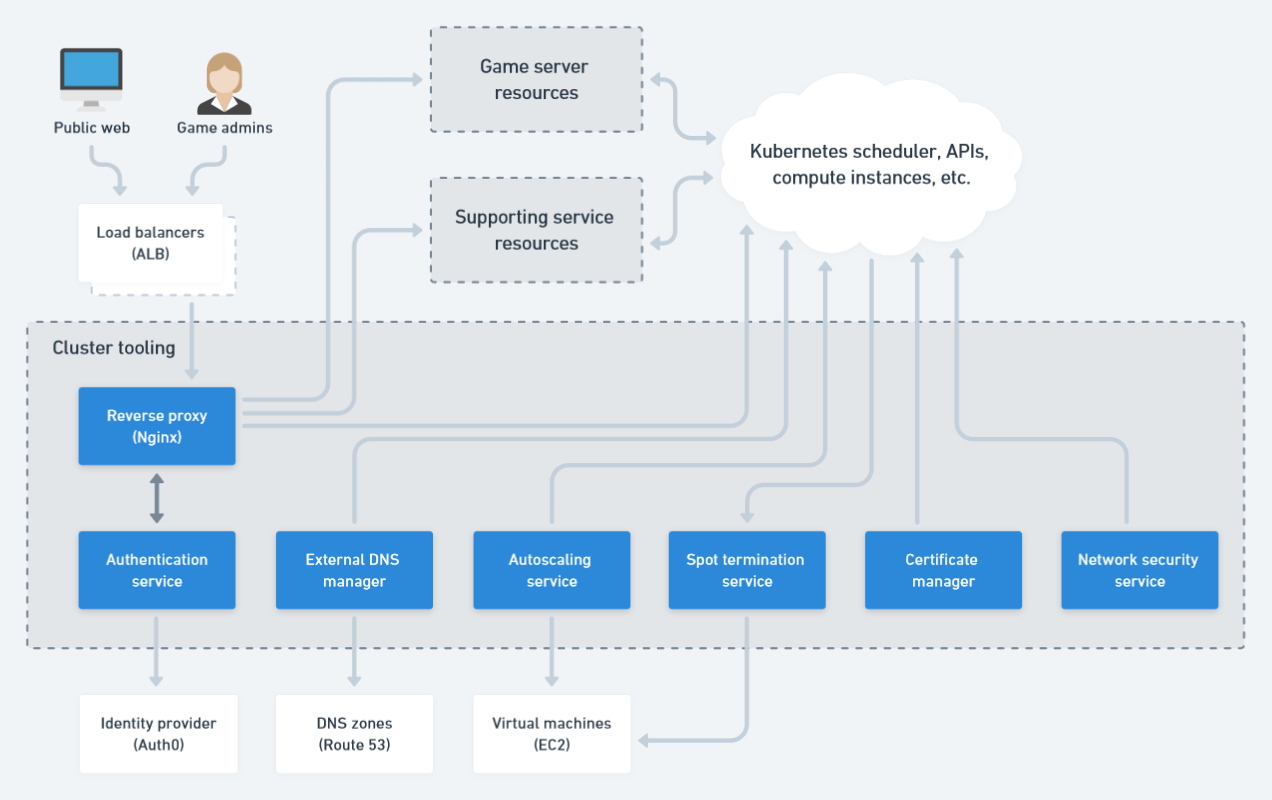
- Networking and connectivity services
- DNS - Managing external DNS resources on behalf of the cluster.
- Reverse proxy - Handling all incoming HTTP traffic and routing it securely within the cluster.
- Authentication - Resolving the roles & permissions of connecting users.
- Network security - Enforcing network policies between different systems within the Kubernetes cluster.
- Autoscaler - Allows configuring the Kubernetes cluster to automatically scale compute nodes up and down depending on resource requests.
- Spot termination handler - Allows for more safely running Kubernetes nodes as spot instances, which can yield up to 70% savings in compute costs.
- Certificate manager - Allows in-cluster systems to request certificates for securing communication.
🔍 Something missing?
The whole Metaplay cloud infrastructure stack is extendable by design, meaning that you can replace our “sensible defaults” with your own solutions for specific areas, or to add additional services onto the cluster easily!
Cloud Security
The Metaplay SDK implements modern cloud security best practices:
- Identity and access control - Users and their roles are handled through a combination of AWS IAM for infrastructure access management and intra-game server accounts and RBAC for application-level security. Additionally, external identity providers are supported through industry-standard OAuth2/OIDC protocols.
- Transport-level security - Data is encrypted at transport using Transport Layer Security (TLS) between endpoints using AWS-managed certificates in AWS ACM.
- Network-level security - Metaplay’s infrastructure is designed to run in private VPCs using security groups and a public/private subnet split to enhance security. In-cluster networking is secured with Calico and Network Policies and configured to restrict cross-namespace connectivity.
- Data security - All game data is encrypted at rest in the AWS RDS and AWS S3 services. Additionally, access to these data sources is controlled via security groups and credentials or role-based access.
- Backups - Backups are taken using AWS Backup. You can customize the backup routines and destinations based on your project’s specific needs.
- Monitoring and alerting - Metrics and logs are collected both in-cluster via Prometheus and Loki and on a cloud-level with CloudWatch’s metrics, logs, and AWS CloudTrail. Grafana is provided for holistic visibility across data sources. Customizable alerting can be managed with Prometheus’ Alertmanager.
No amount of best practices can replace continuous monitoring of the online security landscape and frequent updates to keep all systems up-to-date. We ship regular updates to our infrastructure and help you roll those out into your self-hosted environments!
We also understand that in some cases games may prefer to stick with older Metaplay versions; in these cases, we can work with you to prevent possible security vulnerabilities by backporting critical security fixes as needed.
